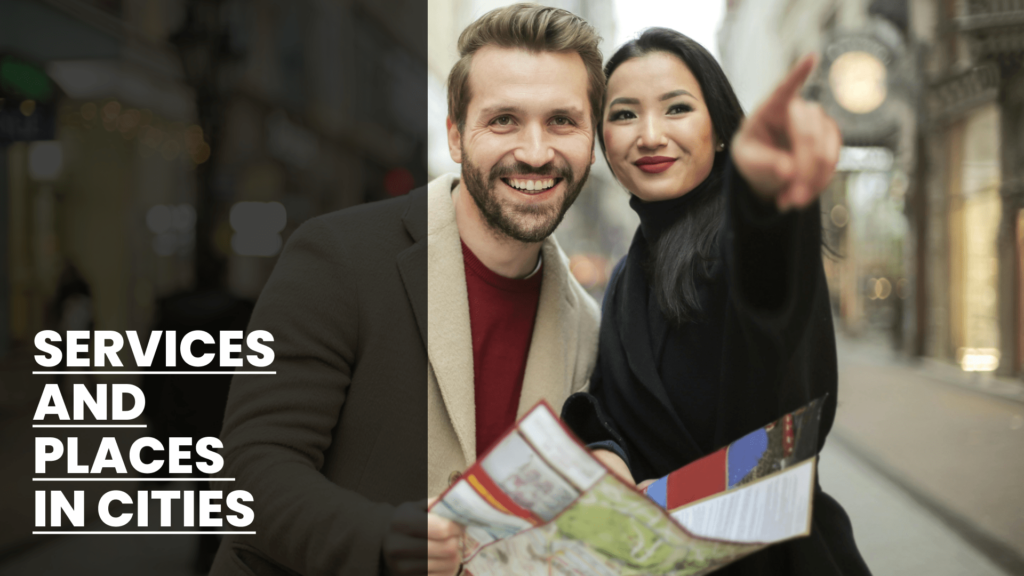
Want to learn Spanish? Try Mondly for FREE now!
Learning Spanish can be a fun and exciting journey, and it all starts with building your vocabulary. Today, let’s focus on services and places in a city. These are things you’ll encounter daily when living or traveling in a Spanish-speaking city. Knowing these basic Spanish words will help you navigate the streets, ask for help, and understand your surroundings much more easily.
As a Spanish learner myself, I’ve learned the hard way that aiming for fluency right away isn’t the best goal when learning a new language. So, if you’re just starting out with Spanish, I highly recommend familiarizing yourself with the CEFR (Common European Framework of Reference). It will guide you on what to focus on at each stage of your learning journey. Check out this article to get a clearer idea of what you should learn as a beginner and what’s expected of you along the way.
Los Servicios (Services)
Let’s begin with some common services you might need when you’re out and about. Whether you’re looking for a place to eat, need to do some shopping, or just want to find a place to relax, knowing these words will make your day much easier.
- El banco (el BAHN-koh) – Bank
- La farmacia (lah far-MAH-see-ah) – Pharmacy
- El hospital (el ohs-pee-TAHL) – Hospital
- La policía (lah poh-lee-SEE-ah) – Police station
- La peluquería (lah peh-loo-keh-REE-ah) – Hair salon
- La gasolinera (lah gah-soh-lee-NEH-rah) – Gas station
- La biblioteca (lah bee-bloh-TEH-kah) – Library
You’ll want to know these terms when you’re in a city and need a quick pit stop. For example, if you run out of medicine, you’ll want to know how to say, “¿Dónde está la farmacia?” (Where is the pharmacy?). Or, if you’re lost, it’s good to know “¿Dónde está la policía?” (Where is the police station?).
Los Lugares (Places) en la Ciudad (Places in the City)
Next up, we’ll take a look at the names of common places you’ll find in any city. From restaurants to parks, these are the places you’ll want to be familiar with as you explore a new city.
- El restaurante (el rehs-tah-oo-RAHN-teh) – Restaurant
- El café (el kah-FEH) – Café
- El parque (el PAHR-keh) – Park
- La plaza (lah PLAH-sah) – Plaza/square
- El museo (el moo-SEH-oh) – Museum
- El cine (el SEE-neh) – Movie theater
- El centro comercial (el SEN-troh koh-mehr-see-AHL) – Mall
- El teatro (el teh-AH-troh) – Theater
- El aeropuerto (el ah-eh-roh-PWEHR-toh) – Airport
- La estación de tren (lah es-tah-SYOHN deh trehn) – Train station
These words will help you feel more confident as you move around the city. For instance, if you want to relax at a café, you can ask, “¿Dónde está el café?” (Where is the café?). Or if you’re ready to catch a movie, try saying, “¿Dónde está el cine?” (Where is the movie theater?).
Asking for Directions
Now that you know some key places, you’ll need to be able to ask for directions. Don’t worry—it’s easier than you think! Here are some simple phrases that will help you get where you need to go.
- ¿Cómo llego a…? (KOH-moh YEH-goh ah) – How do I get to…?
- ¿Está lejos? (ehs-TAH LEH-hohs) – Is it far?
- ¿A qué distancia está? (ah keh dees-TAHN-see-ah ehs-TAH) – How far is it?
- ¿Dónde está…? (DOHN-deh ehs-TAH) – Where is…?
- Gire a la derecha/izquierda (HEE-reh ah lah deh-REH-chah/ees-kee-ER-dah) – Turn right/left
- Siga todo recto (SEE-gah TOH-doh REHK-toh) – Go straight ahead
For example, if you need to find the train station, you can ask, “¿Cómo llego a la estación de tren?” (How do I get to the train station?). Or, if you’re not sure how far something is, you can ask, “¿Está lejos?” (Is it far?).
Extra Vocabulary for Everyday Use
While services and places are a great start, you’ll also want to know some basic vocabulary to help you in other situations. Here are some other useful words to add to your list:
- La calle (lah KAH-yeh) – Street
- La dirección (lah dee-rehk-SYOHN) – Address
- El número (el NOO-meh-roh) – Number
- La esquina (lah es-KEE-nah) – Corner
- El semáforo (el seh-MAH-foh-roh) – Traffic light
- El tráfico (el TRAH-fee-koh) – Traffic
- La acera (lah ah-SEH-rah) – Sidewalk
Knowing these terms will help you get around and understand more of the world around you. For example, when you’re walking down the street, you might ask, “¿Dónde está la calle [name]?” (Where is [street name]?). Or if you need to give your address to a friend, you’ll know how to say, “Mi dirección es [address].”
Try Mondly for Free Now!
Want to improve your Spanish as a beginner? I personally recommend Mondly, as it helped me tremendously when I was just starting out. With its interactive lessons and real-world conversations, it’s an excellent tool for expanding your vocabulary and building confidence in Spanish. Try Mondly now for free!
Wrapping Up: Basic Spanish Words
By now, you’ve learned a good amount of basic Spanish words related to services and places in a city. These are essential words that will help you as you move around, ask for directions, and get the most out of your experience in Spanish-speaking cities. Whether you’re traveling or living in a Spanish-speaking country, knowing these terms will make your journey smoother and more enjoyable.
Remember, every new word you learn is one step closer to mastering Spanish! Keep practicing, and don’t be afraid to ask questions or speak up when you’re out and about. You got this!


